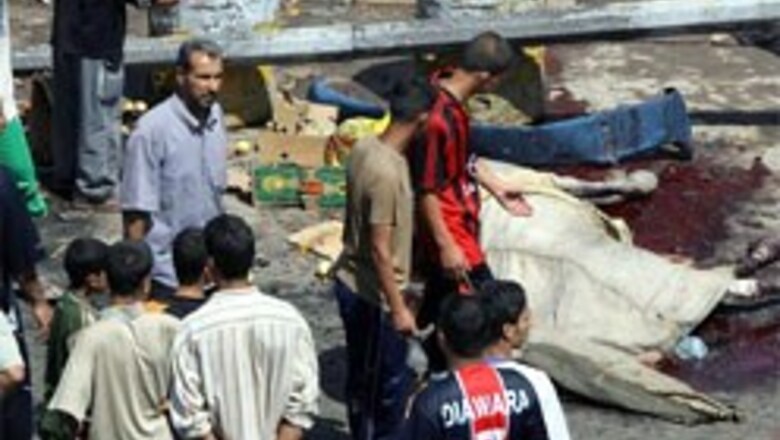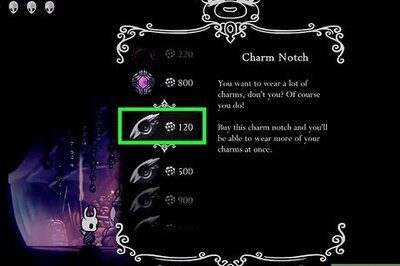
views
Baghdad: A suicide bomber killed more than 30 people on Wednesday in a popular cafe northeast of Baghdad, and three American soldiers died when a roadside bomb exploded northwest of the capital, authorities said.
The bomber blew himself up in a restaurant in Balad Ruz, 45 miles northeast of Baghdad, two police officers said on condition of anonymity because they were not authorized to release the information.
The bomber walked into the cafe where people had gathered and detonated his explosives among customers, police said. At least 30 people - a mix of Sunnis and Shiites - were killed and 25 were wounded, they said.
The US soldiers were killed by the roadside bomb as they patrolled a well-traveled route northwest of Baghdad to clear it of explosives, the military said. Nine soldiers died in two separate attacks on Monday - the deadliest single day for Americans in Iraq in nearly a month.
Attacks on Shiite pilgrims showed no sign of easing, with at least 11 slain as they streamed toward a Muslim shrine ahead of a weekend holiday.
The violence came a day after two suicide bombers exploded themselves among pilgrims lining up at a checkpoint, killing at least 120 people and wounding about 190, police and hospital officials said.
Mourners carried coffins through Hillah, about 60 miles south of Baghdad, where a main street became a swamp of blood and debris after Tuesday's twin attack. Bodies in plastic bags were lined up outside the city's hospital, where the wounded lay on gurneys in crowded hallways.
The Hillah bombings and other attacks on Shiites have been blamed on Sunni insurgents trying to destabilize Iraq's Shiite-dominated government.
The victims had been headed to Karbala, 50 miles south of Baghdad, for weekend rites marking the end of a 40-day mourning period for the death of Imam Hussein, the grandson of the Prophet Muhammad. Hussein died near Karbala in a 7th century battle.
Abbas Ghatie Ali, a 32-year-old pilgrim walking from Baghdad to Karbala on Wednesday, tied a list of emergency contacts around his neck in case he was hurt along the way.
''I'm wearing this card to identify me if I'm killed during the journey to Karbala,'' Ali said. He said he would continue to walk despite attacks on fellow pilgrims, because Shiites are ''the majority and will defend our ideology and doctrine.''
Another pilgrim, Khadija Tawfek Mouhsin, said his brother was killed last year en route to Karbala, but that he was determined to make the journey. ''The terrorists give us the chance to go to paradise,'' the 39-year-old Shiite pilgrim said.
PAGE_BREAK
Community leaders in Karbala met to discuss how to better provide security for the pilgrims, according to a statement from Prime Minister Nouri al-Maliki's office. The Defense Ministry said on Tuesday it would deploy soldiers along the pilgrimage route.
''All the city's entrances have been secured, and I call upon the pilgrims to follow the instructions of the security forces and let them do the necessary searches,'' Iraq's minister of state for national security, Sherwan al-Waili, said in Karbala.
''Terrorists are adapting and improvising new ways of hurting people. Preparations have been made in hospitals to receive emergency cases,'' he said.
Karbala Gov. Aqeel al-Khazalie said 10,000 policeman had been deployed in the city.
The head of the Supreme Council for Islamic Revolution in Iraq, Abdul Aziz al-Hakim, condemned the Hillah bombings and called for more government security during the holiday.
''We call on the security services of the central government and the local authorities ... to chase the masterminds who carry out these ugly crimes,'' al-Hakim said.
Al-Maliki on Tuesday called the Hillah bombings an ''ugly crime against unarmed citizens'' that ''would not pass without punishment.''
But some Shiite leaders have expressed anger at the government for not doing enough to prevent the killings. ''The government bears some responsibility for this,'' complained Shiite lawmaker Bahaa al-Araji. ''It has not provided enough security to protect the pilgrims.''
In the past two years, the powerful Mahdi Army militia of radical cleric Muqtada al-Sadr watched over pilgrimages to Karbala. But the group agreed to put down its arms under intense pressure from the government, which wanted to avoid any confrontations with US-led forces during a Baghdad security crackdown launched last month.

















Comments
0 comment